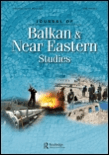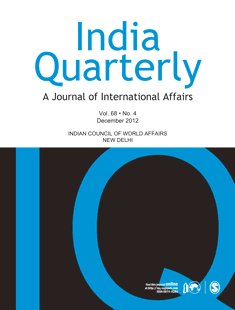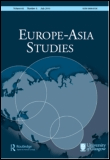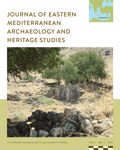
Journal of Balkan and Near Eastern Studies
Scope & Guideline
Empowering Scholars with Open Access to Pivotal Research.
Introduction
Aims and Scopes
- Interdisciplinary Historical Analysis:
The journal emphasizes historical perspectives, exploring the evolution of political, economic, and social structures in the Balkans and Near East, particularly during critical periods such as the Ottoman Empire, the Cold War, and contemporary challenges. - Geopolitical and Economic Studies:
It investigates the geopolitical strategies and economic interactions between nations within these regions, including the impacts of global shifts, trade, and foreign policies on local dynamics. - Cultural and Social Identity Research:
The journal examines issues of identity, nationalism, and cultural heritage, focusing on how historical narratives shape contemporary social dynamics and conflicts. - Migration and Refugee Studies:
A significant area of focus is on migration patterns, refugee crises, and the socio-economic implications of these movements, especially in light of recent conflicts and global challenges. - Environmental and Health Policy Analysis:
The journal includes studies on environmental history, public health policies, and their socio-political implications, reflecting the intersection of ecological concerns with regional stability and development.
Trending and Emerging
- Digital Diplomacy and Soft Power:
There is an increasing focus on the role of digital diplomacy and soft power in international relations, particularly how countries in the Balkans and Near East leverage cultural resources and technology to enhance their global standing. - Migration and Refugee Integration:
Research on the integration of migrants and refugees has surged, particularly in light of recent crises, examining the socio-economic impacts, public policy responses, and narratives surrounding migration. - Climate Change and Environmental Politics:
Emerging studies focus on the implications of climate change and environmental policy in the Balkans and Near East, highlighting the intersection of ecological issues with regional stability and resource management. - Populism and Authoritarianism:
There is a growing interest in the rise of populism and authoritarianism within the region, exploring how these movements reshape political landscapes and influence public policy. - Transnational Relations and Globalization:
Research increasingly examines transnational relationships and the influence of globalization on local economies and societies, reflecting a shift towards understanding global interconnectedness in regional contexts.
Declining or Waning
- Cold War Studies:
Research focusing specifically on the Cold War era, particularly in relation to the Balkans, has seen a decline. This may indicate a broader interest in more contemporary issues or a shift towards examining the long-term consequences of Cold War policies rather than the period itself. - Classical Ottoman Studies:
While historical studies remain relevant, there seems to be a waning interest in purely classical Ottoman studies, particularly those that do not connect to modern political or social issues, as researchers increasingly seek to relate historical context to current dynamics. - Traditional Economic Models:
There has been a noticeable decrease in the exploration of traditional economic models and frameworks that do not account for the complexities of globalization and neoliberalism, as contemporary analyses increasingly focus on the intersections of economics with politics and social factors. - Regional Security Studies:
The focus on traditional security studies that emphasize military and state-centric perspectives has declined, with a growing preference for examining security through a broader lens that includes societal resilience and non-state actors. - Bilateral Historical Relations without Contemporary Context:
Research centered on historical bilateral relations that lacks a contemporary analysis or implications has become less frequent, indicating a trend towards more integrated studies that consider historical legacies in current geopolitics.
Similar Journals

Asian Journal of Middle Eastern and Islamic Studies
Unlocking the Nuances of Middle Eastern Socio-PoliticsThe Asian Journal of Middle Eastern and Islamic Studies, published by TAYLOR & FRANCIS LTD, is an esteemed peer-reviewed journal devoted to the comprehensive exploration of Middle Eastern and Islamic studies. With an ISSN of 2576-5949 and an E-ISSN of 2576-5957, the journal provides a platform for cutting-edge research and scholarly analysis that contributes significantly to the understanding of contemporary and historical issues within these dynamic fields. The journal seeks to attract a global readership of researchers, professionals, and students, enhancing interdisciplinary discourse and promoting scholarly excellence. By offering insights ranging from socio-political developments, cultural studies, and Islamic traditions to modern implications, the journal stands out as an essential resource for those engaged in this vital area of study, fostering a deeper understanding of the complexities and nuances of the region.

Journal of Ancient Near Eastern Religions
Bridging Cultures Through the Lens of Ancient FaithThe Journal of Ancient Near Eastern Religions is a leading scholarly publication, dedicated to the comprehensive exploration and analysis of the religious practices, beliefs, and cultural contexts of the ancient Near East. Published by BRILL in the Netherlands, this journal has maintained a prominent presence in the field since its inception in 2001, with its research contributions now spanning toward the year 2024. With an impressive Q2 ranking in both the History and Religious Studies categories for 2023, the journal is recognized for its rigorous scholarship and critical engagement within these disciplines. Researchers benefit from insightful articles that delve into various aspects of ancient religions, fostering an environment of dialogue and collaboration. While the journal is not open access, it provides numerous routes for academic institutions to grant their members access to high-quality content. As a must-read for scholars, professionals, and students alike, this journal serves as a vital resource for understanding the intricate tapestry of ancient Near Eastern beliefs and practices.

POST-SOVIET AFFAIRS
Fostering Interdisciplinary Insights into Post-Soviet AffairsPOST-SOVIET AFFAIRS, published by ROUTLEDGE JOURNALS, TAYLOR & FRANCIS LTD, is a distinguished academic journal dedicated to exploring the socio-economic and political transformations of post-Soviet states since its inception in 1992. With a significant focus on interdisciplinary collaboration, the journal garners an impressive impact factor, underscoring its vital role in the study of contemporary issues in economics, political science, and sociology, as evidenced by its Q1 ranking in these fields in 2023. Operating from the United Kingdom, the journal champions critical analysis and encourages contributions that enhance understanding of the complex dynamics within post-Soviet societies. Researchers, professionals, and students are welcomed to engage with its rich repository of articles, each offering insights into transitional economies, international relations, and social changes. While the journal is not open access, it remains a pivotal resource for anyone wanting to stay informed on impactful research trends and findings in this vital area of study.

India Quarterly-A Journal of International Affairs
Unveiling Insights into India's Global RoleIndia Quarterly-A Journal of International Affairs, published by SAGE PUBLICATIONS INDIA PVT LTD, is a pivotal platform dedicated to the study of international relations and political science, particularly with an emphasis on India’s role in global affairs. Established in 1954, this esteemed journal has been providing comprehensive insights and critical analyses over the decades, with issues that span converged years from 1954 to 1963, from 1966 to 2008, and from 2011 to 2024. Ranked in the Q3 category within the domains of Political Science and International Relations and holding a Scopus rank within the 48th percentile, it serves as a valuable resource for researchers, policymakers, and academicians alike. Though not an open-access journal, its rigorous selection process ensures the dissemination of high-quality research, making it an essential reference for those keen on understanding the complexities of international affairs associated with India. With its base in New Delhi, the journal is committed to fostering scholarly dialogue and advancing knowledge on crucial global issues.

New Perspectives
Cultivating diverse perspectives for a rapidly evolving world.New Perspectives is a pivotal academic journal published by SAGE Publications Inc, dedicated to advancing the fields of Political Science and International Relations. With a focus on innovative research and critical analysis, it has established a notable presence since its inception in 2015, currently holding a Q3 ranking in its category for 2023. Based in the Czech Republic, New Perspectives has a robust Scopus rank of #292 out of 706, placing it in the 58th percentile among social science journals. This underscores its significance in fostering scholarly dialogue and presenting fresh ideas in a rapidly evolving global landscape. While not open access, the journal attracts a diverse readership, including researchers, professionals, and students who are keen on exploring emerging trends and insights in political theory and international discourse. The journal’s commitment to high-quality scholarship makes it an essential resource for those aiming to contribute to and engage with contemporary political challenges.

Russian Journal of Vietnamese Studies-Vyetnamskiye issledovaniya
Illuminating Vietnam: A Gateway to Southeast Asian StudiesRussian Journal of Vietnamese Studies-Vyetnamskiye issledovaniya is a specialized academic journal dedicated to the exploration and dissemination of knowledge pertaining to Vietnamese culture, history, and society. Published by CENTER VIETNAM & ASEAN STUDIES, this journal serves as a critical platform for researchers, professionals, and students interested in the multifaceted connections between Russia and Vietnam, as well as broader Southeast Asian studies. With a commitment to open access and the highest standards of scholarship, the journal addresses pressing contemporary issues and historical insights, fostering a deeper understanding of Vietnam's role in the global context. Housed at the INST FAR EASTERN STUDIES of the RUSSIAN ACADEMY OF SCIENCES in Moscow, the journal aspires to enrich the academic dialogue surrounding Vietnamese studies and promote collaborative research efforts within the region. Researchers can look forward to insightful articles that contribute to the fields of cultural studies, international relations, and social sciences.

EUROPE-ASIA STUDIES
Fostering dialogue on cross-continental relations.EUROPE-ASIA STUDIES, published by Routledge Journals, Taylor & Francis Ltd, is a prestigious academic journal that bridges the interdisciplinary gaps between economics, history, sociology, and geography, offering a comprehensive analysis of the dynamic relationship between Europe and Asia. Since its inception in 1993, the journal has become a crucial platform for scholars to share innovative research, evidenced by its notable rankings in the 2023 category quartiles, achieving Q1 status in History and Sociology and Political Science, and Q2 in Economics and Geography. With an impact factor that reflects its significance in the field, authors and researchers are encouraged to engage with its rigorous and thought-provoking contributions, fostering a greater understanding of cross-continental issues. Situated in the United Kingdom, EUROPE-ASIA STUDIES also provides a vital forum for emerging topics, facilitating discourse on the evolving socio-economic landscapes of both regions. Whether you're a researcher, professional, or student, this journal is essential for anyone invested in the nuanced examination of Europe-Asia relations.

Journal of Eastern Mediterranean Archaeology and Heritage Studies
Uncovering the Past, Preserving the FutureJournal of Eastern Mediterranean Archaeology and Heritage Studies, published by Penn State University Press, is a premier academic journal dedicated to the exploration and understanding of the archaeological and heritage landscapes of the Eastern Mediterranean region. With an ISSN of 2166-3548 and an E-ISSN of 2166-3556, this journal serves as an essential resource for researchers, professionals, and students in the fields of archaeology, conservation, and heritage studies. Its notable impact is reflected through its Q2 category rankings in both Archaeology and Conservation, coupled with commendable Scopus rankings, positioning it within the top quartiles of its disciplines. The journal not only fosters scholarly dialogue by publishing cutting-edge research but also aims to bridge the gap between academic inquiry and practical conservation efforts. As the field continues to evolve, this journal provides a vital forum for disseminating knowledge and advancing the preservation of cultural heritage, making it indispensable for all engaged in the study of the Eastern Mediterranean’s rich archaeological heritage.

Journal of Ancient Near Eastern History
Illuminating the Legacy of the Near EastJournal of Ancient Near Eastern History, published by Walter de Gruyter GmbH, is a pioneering platform dedicated to the exploration and analysis of the ancient Near East, spanning topics such as archaeology, history, and cultural studies. With its ISSN 2328-9554 and E-ISSN 2328-9562, this journal engages a diverse audience of researchers, professionals, and students who are eager to deepen their understanding of this historically rich region. Although currently not an open access journal, its rigorous peer-review process ensures that each publication maintains high scholarly standards. Aimed at fostering interdisciplinary dialogue, the Journal of Ancient Near Eastern History serves as an essential resource for anyone interested in the complexities of ancient civilizations, their legacies, and their relevance in contemporary society. With a commitment to advancing scholarship in this field, the journal is poised to contribute valuable insights and foster critical discussions among historians and archaeologists alike.

Studia Europejskie-Studies in European Affairs
Illuminating the Complexities of EuropeStudia Europejskie - Studies in European Affairs, published by the esteemed University of Warsaw Centre for Europe, is an acclaimed peer-reviewed open access journal that has been dedicated to the exploration and critical analysis of European affairs since its inception in 1997. With its ISSN 1428-149X and E-ISSN 2719-3780, this journal serves as a pivotal platform for scholars, researchers, and practitioners who aim to deepen their understanding of European integration, policies, and sociocultural dynamics. The journal plays a significant role in disseminating high-quality research that fosters dialogue and knowledge exchange within the European studies community and beyond. By providing unrestricted access to its content, Studia Europejskie ensures that valuable insights into pressing European issues reach a wide audience, promoting informed debate and academic collaboration. Join a vibrant scholarly community by contributing to and engaging with the latest research on European affairs.